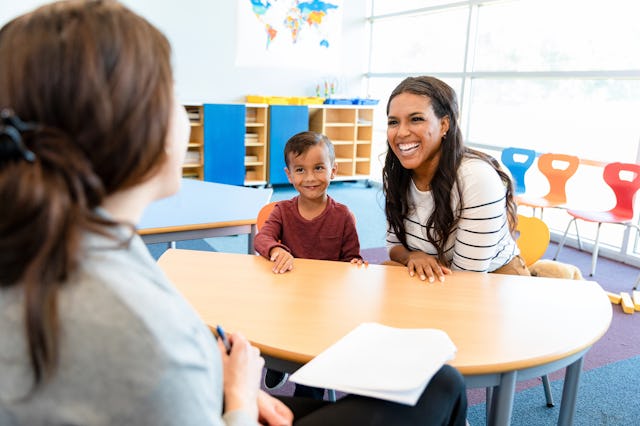How To Nail The Parent-Teacher Conference
You only get a few minutes to hear how your child is doing in school. Here’s how to make the most of a meeting with the teacher.

You could talk all day about your kid. So it’s always a shock when you have a parent-teacher conference and only get about 10 minutes total to hear how your kid is doing, and respond. Be prepared in advance for what is essentially a lighting round on your kid’s progress, then leave feeling like you got the most you could out of it.
A few ground rules: Be kind to the teacher. Assume the teacher likes kids and does understand them. Accept that the teacher might have insight into your kid that you don’t, because you are busy parenting and they have their eye on how they’re learning. Most importantly, remember that you can take some time to process whatever you hear in this parent-teacher conference and circle back later with an email.
Here’s how to nail your 10-minute slot.
Consider bringing your kid, if policy allows.
Sometimes you’re supposed to have your kid with you so they hear the update too. Other times, this is adult-to-adult time. Find out in advance. I will say that the older my now-teens have gotten, the more important it’s been for them to attend parent-teacher conferences. That’s because with every year there’s more responsibility on them (especially with homework) and less on me.
Show up on time but be prepared to wait.
It’s a huge no-no to miss your time slot because the teacher has to talk to every kid’s parents. They can’t wait for you and bump everybody back. But inevitably, someone’s conference runs long and the teacher gets behind which is why, unless you’re the very first appointment, you’ll probably be waiting. Pro tip: Snag the first appointment if you can!
Keep the pleasantries short – you’ve only got a few minutes!
I have made the mistake, multiple times, of trying to engage a teacher by asking about their recent wedding or their own kid. It’s so hard for me to turn off my social self. Now I tell myself ahead of time to keep my big mouth shut. Say hello, and acknowledge, “I know we only have a few minutes!” Then get right to it.
Listen up!
Usually the teacher has thought ahead of time about what they want to say. Fingers crossed, it’s just that your kid is the absolute best. But chances are there’s also some nugget of what your kid needs to work on, and you’ll need to absorb whatever that is. Sometimes, there’s also a homework assignment for you, the parent. I had a crushing preschool conference where I was called out for my super-lame lunches, which I think is funny now, but was a drag to hear at the time.
Don’t say anything crazy.
Just don’t be that parent. The worst thing I ever blurted out was, “My child hates your class.” I regretted it immediately, and again later. Immediately, because the teacher was a young childless thing teaching middle-school science and her poor face just fell. Later because, wouldn’t you know it, my freakin’ child started to love the class within a month and ended the year singing the teacher’s praises. But by then I had already branded myself as the A-hole parent.
Be prepared with your most important question.
Good teachers tend to rattle off your child’s strengths, weaknesses, how they’re doing academically, and how they’re doing socially. They’ll show you homework examples and a few test scores. With 60 seconds left they’ll ask, “Any questions?” That’s why I say to have any big question prepared in advance.
“Big” is relative but everyone has something, from “can he please switch seats to be by a friend/away from a frenemy” to “we’re starting family therapy and I want you, his teacher, to know.” Don’t tell the teacher to go easy with grades, that’s an obnoxious ask. But you can ask about homework-policy wiggle room and leniency with mild tardiness. I feel like those issues bleed into home life and this is your chance to explain what’s going on outside of school.
I also checked in with a set of my teacher friends. They said if you don’t have any big concern you know you want to bring up, this is always the best question to fall back on: “What can I do to help my child at home?”
End on a good note.
That way you can go back with that all-important follow-up, if needed. Kids are complicated and a parent-teacher conference just scratches the surface and opens the door for an ongoing convo. Thank the teacher, and email them later when you think of more questions. Like, “So what should I put in that lunchbox?”
This article was originally published on